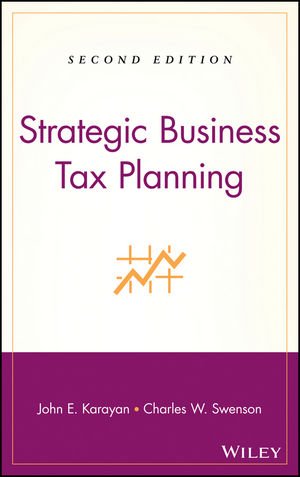Strategic Business Tax Planning, 2nd EditionISBN: 978-0-470-00990-1
Hardcover
480 pages
October 2006
 This is a Print-on-Demand title. It will be printed specifically to fill your order. Please allow an additional 15-20 days delivery time. The book is not returnable.
|
||||||
About the Authors v
Acknowledgments xiii
Introduction xv
Part 1 Strategic Tax Planning 1
Chapter 1 A Framework for Understanding Taxes 3
How are Taxes Important in Decision Making? 5
Types of Taxes 8
Basic Principles of Taxation 30
Sources of Tax Laws 35
Important Principles and Concepts in Tax Law 42
SAVANT Framework 56
Chapter 2 Using the SAVANT Framework to Guide Tax Planning 61
Strategy 63
Anticipation 66
Value-Adding 72
Negotiating 83
Transforming 85
Putting It All Together: SAVANT Concepts Illustrated 87
Part 2 Forming the Enterprise 93
Chapter 3 Choosing a Legal Entity: Risk Management, Raising Capital, and Tax Management 95
Strategy 100
Anticipation and Timing Issues 106
Value-Adding 108
Negotiating 110
Transforming 112
Putting It All Together: Applying SAVANT to Entity Choice 116
Specialized Legal Forms 118
Chapter 4 Financing a New Venture 125
Internal Financing 126
External Financing: Debt versus Equity 129
Part 3 Operating the Firm 153
Chapter 5 New Products: Development, Promotion, and Advertising 155
New Products and Product Improvement 155
SAVANT and Research and Development 175
Chapter 6 Attracting and Motivating Employees and Managers: Company and Employee Tax Planning 179
Executive Compensation 180
Nonexecutive Employee Compensation 182
Perquisites 189
Pension and Profit-Sharing Plans 191
Current and Deferred Compensation 195
Limits on Deductibility on Executive Compensation 195
Stock Options 196
Management Bonus Plans 202
Financial Statement/Finance versus Tax Strategy Trade-Offs 204
Putting It All Together: Applying SAVANT to Executive Compensation 206
Chapter 7 Market Penetration: Operating in Different States 213
General Principles of State and Local Taxation 216
Planning with Income Taxes: Manipulation of Plant, Workforce, and Point-of-Sale Locations 217
Location Choice: Sourcing versus Production Platforms 228
Distribution: Planning for Sales and Use Taxes 230
Lobbying and Tax Abatements 235
Trade-Offs with Local Tax Incentives: Infrastructure, Government Costs/Subsidies, and Other Local Costs 237
Putting It All Together: SAVANT Applied to Market Penetration in Other States 237
Chapter 8 Market Penetration: Company and Employee Tax Planning for Operating in Foreign Countries 241
Some Basics on U.S. Taxation of Overseas Operations 241
Some Basics on Taxation by Countries Other than the United States 244
Tax Treaties 245
Effective Tax Management 247
Putting It All Together: Penetrating Foreign Markets from a SAVANT Perspective 263
Chapter 9 Operations Management 269
Production Design and Process Selection 269
Inventory: Methods of Accounting and Includable Amounts 273
Strategic Capacity Planning: Plant versus People 283
Putting It All Together: Operations Management from a SAVANT Perspective 289
Chapter 10 Financing Ongoing Operations and Tax Planning 293
Operating Earnings 294
Sale of Operating Assets 294
Sale of Investments 296
Short-Term Borrowing 298
Accounts Receivable 299
Decrease in Dividends 300
Stock Dividends 302
Stock Buybacks 303
Using Employee Stock Ownership Plans 305
Receipt of Dividends from Subsidiaries 306
Putting It All Together: Financing Ongoing Operations from a SAVANT Perspective 312
Chapter 11 Capital Budgeting 319
Fixed Asset Acquisition 319
Analysis from a SAVANT Perspective 324
Putting It All Together: SAVANT Concepts Applied to Capital Budgeting 332
Make or Buy Decisions 334
Capital Budgeting and Plant Capacity 338
Risk Considerations 343
Chapter 12 Financial Statement Analysis and Proactive Tax Planning 347
Segmental Analysis 347
Other Tax Aspects in Segmental Analysis 350
Strategic Analysis: Using Competitor’s Tax Note and Segmental Data 356
Part 4 Changing Original Form 367
Chapter 13 Restructuring 369
Financial Restructuring 369
Financial Restructuring in the SAVANT Framework 372
Business Restructuring 375
Legal Entity Restructuring 376
Divestitures in the SAVANT Framework 382
Selling Off Parts of the Business 383
Selling a Business to an Outside Entity 384
Chapter 14 Mergers and Acquisitions 391
Some General Tax Rules 393
Tax-Free Mergers and Acquisitions 393
Statutory Mergers and Consolidations 395
Taxable Mergers and Acquisitions 402
Tax Planning and Acquisition Costs 405
Allocating Purchase Price 406
Financial Accounting Trade-Offs 406
Maximizing Tax Benefits 407
Leveraged Buyouts 411
Sources of Merger and Acquisition Finance 412
Defensive Strategies 415
Merger and Acquisition Activity and Scrutiny by Tax Authorities 416
Putting It All Together: Merger and Acquisition from a SAVANT Perspective 417
Chapter 15 Other Topics in Changing Original Form 421
Use of Flow-Through Entities for Divestitures 421
Use of Flow-Through Entities for Acquisitions 425
Liquidations 426
Buying a Subsidiary for Its Assets 432
Fighting Off Takeover Attempts with ESOPs 437
Bankruptcies 439
Appendix A Basic Tax Research Skills 441
Steps in the Research Process 441
Sources of the Law 441
Getting Answers to Simple Questions 443
Appendix B Present Value Analysis: Lump Sums 445
Annuities 447
Uneven Cash Flows 449
Index 451



